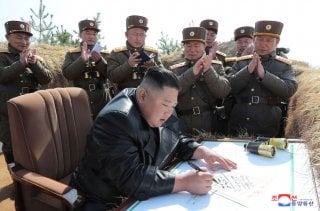Why the Korean War Is Unlikely to End for Good Anytime Soon
Despite how important it is, Pyongyang doesn't want to give up its nukes and U.S.-China rivarly only make things worse.
Editor's Note: As the world commemorates the 70th anniversary of the start of the Korean War, the Center for the National Interest’s Korean Studies team decided to ask dozens of the world’s top experts a simple question: Do you believe that the Korean War will finally come to an end before its next major anniversary in 2025? The below piece is an answer to that question. Please click here to see even more perspectives on this important topic.
Nearly 70 years have passed since the Korean War stopped, but the two Koreas are still divided and inter-Korean relations remain, legally, at a state of war. While the cease-fire continues, the Korean Peninsula has been experiencing unstable peace, with large and small armed clashes occurring within the framework of the armistice system. The relative peace experienced on the Korean Peninsula has been the result of an unstable balance of military power and an armistice agreement which was intended to be temporary. Thus, for lasting peace to come upon the Korean Peninsula, the Korean War must be ended officially and a permanent peace regime established.
Why is it important to finally end the Korean War? Because ending the Korean War is a starting point for building a lasting peace regime on the Korean Peninsula. Consider Article 3 of the Panmunjom Declaration for Peace, Prosperity and Unification of the Korean Peninsula signed by South Korean President Moon Jae-in and North Korean Leader Kim Jong-un on April 27, 2018. That article states that the two sides will actively cooperate to build a permanent and stable peace regime on the Korean Peninsula. It also argues that bringing an end to the current unnatural state of armistice and establishing a firm peace regime on the Korean Peninsula is a historic mission that must not be delayed any further. Particularly, Phrase 3 of Article 3 states that “the two sides agreed to declare the end of war this year [2018] that marks the 65th anniversary of the Armistice Treaty and actively promote the holding of trilateral meetings involving the two sides and the United States, or quadrilateral meetings involving the two sides, the United states, and China with a view to replacing the Armistice Treaty with a peace agreement and establishing a permanent and solid peace regime.” The pledge, of course, has not been realized.
The establishment of a peace regime on the Korean Peninsula is an item of high importance in the Moon administration’s North Korea agenda. Roughly speaking, a peace regime for the Korean Peninsula would seek to establish a framework for the coexistence of the two Koreas by ending the unstable armistice on the peninsula and eliminating the possibility of a war. With the rise of North Korea’s nuclear threats, the peace regime debate has been inextricably intertwined with the denuclearization of North Korea. Indeed, the core of a peace regime on the Korean Peninsula would be the denuclearization of North Korea, and peace without denuclearization would be nothing but a castle on the sand. The very first step toward a successful denuclearization negotiation would be the declaration of an end to the Korean War. However, officially ending the Korean War is unlikely to be achieved by 2025 for two reasons.
First, there is little chance that North Korea will give up its nuclear weapons program on its own or that denuclearization negotiations between the United States and North Korea will produce any meaningful results soon. In April 2012, North Korea revised the preamble of its constitution to clearly recognize itself as a nuclear power. Then in March 2013, a plenary meeting of the Party Central Committee was held to confirm the “byeongjin policy,” which pursues economic development and nuclear power simultaneously. North Korea’s policy of pushing for both nuclear weapons and economic development is fundamentally opposed to the position of South Korea and the United States that a peace regime presupposes the North’s denuclearization, signaling that Pyongyang has no intention to give up its valuable strategic arsenal.
Second, worsening U.S.-China strategic competition in the post-coronavirus era will make negotiations on North Korea’s denuclearization more difficult. This will, in turn, also make it difficult to realize a declaration to end the Korean War. A declaration is just a declaration, not a treaty or statute that is legally binding. Nonetheless, if a declaration of the end of the war is to lead to a meaningful peace regime, it should be approved by neighboring countries such as China, Japan, and Russia, as likewise for a declaration between the U.S. and North Korea. However, strategic competition between the United States and China after COVID-19 is expected to worsen, which would give them little incentive to cooperate on this issue.
Recently, North Korea blew up the inter-Korean liaison office in Kaesong, marking a sharp turn toward heightened hostilities between Seoul and Pyongyang. Pyongyang subsequently rejected a South Korean offer to send a special envoy for urgent talks and instead announced plans to remilitarize the DMZ, which had been disarmed following the 2018 inter-Korean Comprehensive Military Agreement. As a result, inter-Korean relations have regressed to the state things were before the June 15 Joint Declaration, which called for the two Koreas to work together to resolve the issue of national reunification. Given this, it seems quite difficult to expect a declaration of the end of the Korean War by 2025.
Sang Hyun Lee is a Senior Research Fellow at the Sejong Institute and the President of the Korea Nuclear Policy Society (KNPS). He served as Director-General for Policy Planning at the Ministry of Foreign Affairs from 2011—2013 and he has also served as a policy advisor for the Ministry of National Unification, the Ministry of Foreign Affairs, and the Ministry of National Defense.
Image: Reuters.

